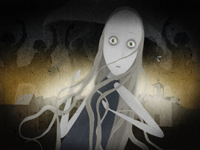Animated Murder Ballad Mesmerizes (and Terrifies)
With a running time of just 6 minutes and 55 seconds, Polish director Bartek Kulas’ debut in animation, MILLHAVEN, is an expert – if microcosmic – example of suspense that builds quietly, creepily, and just at the anticipated moment of climax: dissipates.
MILLHAVEN is Kulas’ interpretation of the Nick Cave and Bad Seeds’ song of the same length, “The Curse of Millhaven.” With the assistance of a translator, singer, and even choreographer (Roman Kołakowski, Katarzyna Groniec, and Jana Kulmatycka, respectively), Kulas retells the story of a small town ravaged by an unassuming blonde and blue-eyed girl, Loretta, called Lottie. The film opens with a setting golden sun in an otherwise nightmarish place fit for a Burton storytelling; flies buzz in and out of view, resting occasionally on the corpse of a grief-stricken town. Wide-eyed and unblinking, Lottie is in a desolate room, where one might easily assume her to be stuck and alone – hiding from the horrors outside.
It quickly becomes clear, however, that the even keel in Lottie’s voice does not belong to a girl frightened into a monotonous shock, but one who is possessed by (and possessor of) the happenings around her. Telling the story, she writhes on the floor, and her hair – long blonde dreadlocks – move like isolated limbs with their own intentions. She is a budding Medusa. Her eyes narrow into the closest thing to a smile she can muster when she sings the chorus of “Tra-la-la-la-la,” a staccato utterance of the kind of ditty you might expect from a fifteen-year-old girl, but this version is disturbingly pointed and far from whimsical.
The film overall is quite still, making each movement more striking—Lottie’s crossing eyes and twisting arms all the more mesmerizing and controlled, showing us a girl who has lost her mind. As she unravels, the camera shakes, new instruments are introduced to the music and the tempo picks up speed, seemingly expediting the corrosion of her sanity. When Groniec’s voice deepens and hoarsens, and Lottie’s face bunches into sneers, the shaking camera has a Blair Witch effect in which the viewer could be watching the story unfold from a nearby corner, anticipating Lottie’s attention and psychotic wrath at any moment.
Kulas moves the story away from the dark, quiet room with shadows of Degas-like ballerinas on the wall, and places Lottie on a stage. The warmth of the golden sun is gone. But she is basked in the artificial light of bright yellow spotlights switching on for her final dance: choppy movements more reminiscent of Stalin’s boots and a flamenco dancer’s snaps and stomps than a fluid, weightless prima. Still Lottie is hypnotizing, with the brightness of the sun’s return behind her, we are with her the entire time despite the likelihood that she will attack something or someone at any moment. As it turns out, we are safe. Because Lottie has been caught for her crimes and is singing to us from an asylum, where she has “got shrinks that will not rest with their endless Rorschach tests/… They ask if [she feels] remorse and [she answers], ‘Why, of course! There is so much more I could have done if they’d let me!’”
This song originated on Cave’s album, Murder Ballads, also the name of an established genre dedicated to crimes of passion. But whereas Cave’s performance of the song is festive (if sardonic) in spirit, Kulas’ interpretation is more measured. Is it portrayed with more of the elements of traditional storytelling because Kulas is a filmmaker and movies have beginnings, middles, ends – whereas songs bring us back to choruses? Should we stray too far from the point? Who knows. But what Kulas manages to do in the very same seven minutes, is create change in the ambience, bring our attention to the words and summon responses with the mixed-up music and varied voice. The irony, of course, is that Kulas’ animated interpretation of “Millhaven” is the more human of the two. It is Cave’s lyrics that criticize our mental health system (where it’s “Rorschach and Prozac and everything is groovy”); but it’s Kulas’ animation that presents us with a moment of sympathy for the ultimate exhaustion and surrender of those who have lost their minds and are left to formulaic treatment.
In the end, Lottie is curled up in a tangle of arms and hair, her frantic energy and blinding hunger for distraction subsided. The urges have left her. And as she sings a final “tra-la-la-la-la,” the sounds turn meeker and escape her like the small ball of light that falls out of her palm, and grows into what at first looks like a glowing sun, but expands and crackles like fire. Perhaps she is burnt out. Or maybe she hasn’t faded at all. Just like staring at the sun for too long, we simply can’t see clearly anymore, and are under her spell.


